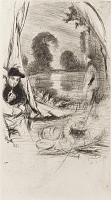The Camp | ||
| Number: | 80 | |
| Date: | 1861 | |
| Medium: | drypoint | |
| Size: | 288 x 159 mm | |
| Signed: | 'Whistler.' at lower left | |
| Inscribed: | '1861.' at lower left | |
| Set/Publication: | 'Cancelled Plates', 1879 | |
| No. of States: | 1 | |
| Known impressions: | 20 | |
| Catalogues: | K.82; M.82; T.68; W.75 | |
| Impressions taken from this plate (20) | ||
KEYWORD
camp, cancelled plate, man seated, fisherman, landscape, picnic, portrait, river, tree.
TITLE
The titles used by Whistler and published by his cataloguers are variations on 'The Camp' and 'Encamping', as follows:
'The Camp' (1863, Whistler). 3
'The Encampment' (ca 1873, Whistler). 4
'Encampment' (1877, Whistler). 5
'Encamping' ( 1886, Frederick Wedmore (1844-1921)). 6
'The Encampment' (1909, Howard Mansfield (1849-1938)). 7
'Encamping' (1910, Edward Guthrie Kennedy (1849-1932)). 8
Whistler clearly changed his mind several times, but the original title, 'The Camp', is clear and can not be confused with any other print.
Whistler's pencil inscription 'The Encampment', on an impression of the drypoint, was written slightly later, and formed the basis for Mansfield's title. However, this title could be confused with that of The Punt [82], which was published as 'Encampment; The Angler' by the Junior Etching Club in 1862.
'The Camp' (1863, Whistler). 3
'The Encampment' (ca 1873, Whistler). 4
'Encampment' (1877, Whistler). 5
'Encamping' ( 1886, Frederick Wedmore (1844-1921)). 6
'The Encampment' (1909, Howard Mansfield (1849-1938)). 7
'Encamping' (1910, Edward Guthrie Kennedy (1849-1932)). 8
Whistler clearly changed his mind several times, but the original title, 'The Camp', is clear and can not be confused with any other print.
Whistler's pencil inscription 'The Encampment', on an impression of the drypoint, was written slightly later, and formed the basis for Mansfield's title. However, this title could be confused with that of The Punt [82], which was published as 'Encampment; The Angler' by the Junior Etching Club in 1862.
3: Whistler to W. H. Carpenter, 3 August 1863, GUW #11109.
5: Whistler to C. A. Howell, 14-16 November [1877], GUW #13668.
6: Wedmore 1886 A (cat. no. 75).
7: Mansfield 1909 (cat. no. 82).
8: Kennedy 1910 (cat. no. 82).
DESCRIPTION
A river-side scene, framed by the trunks of two trees, with more trees on the far side of the river, reflected in the water, under a dark sky. In the foreground is a campfire, with pots, plates, and a barrel or basket by the fire. Two men are sitting on the left, one smoking a pipe and wearing dark clothes and a dark, wide brimmed hat; and on the right a man stands looking left over the river, also smoking a pipe.
SITTER
Whistler wrote 'Ridley / Edwards - / Boatman - / The Encampment -' on one impression ( ). Matthew White Ridley (1837-1888) and Edwin Edwards (1823-1879) were close friends of the artist. Ridley also appears battling the inclement weather in Whistler's dramatic landscape, The Storm [81] and playing the guitar in The Guitar Player (M.W. Ridley) [124]. 9
). Matthew White Ridley (1837-1888) and Edwin Edwards (1823-1879) were close friends of the artist. Ridley also appears battling the inclement weather in Whistler's dramatic landscape, The Storm [81] and playing the guitar in The Guitar Player (M.W. Ridley) [124]. 9
 ). Matthew White Ridley (1837-1888) and Edwin Edwards (1823-1879) were close friends of the artist. Ridley also appears battling the inclement weather in Whistler's dramatic landscape, The Storm [81] and playing the guitar in The Guitar Player (M.W. Ridley) [124]. 9
). Matthew White Ridley (1837-1888) and Edwin Edwards (1823-1879) were close friends of the artist. Ridley also appears battling the inclement weather in Whistler's dramatic landscape, The Storm [81] and playing the guitar in The Guitar Player (M.W. Ridley) [124]. 9 9: Gatty 1974; Gatty 1981.
Wedmore stated incorrectly that the seated figures were 'Ridley, the artist, and Freer', but Charles Lang Freer (1856-1919) had not met Whistler nor started collecting his work at this date.
SITE
Whistler and his friends, including Matthew White Ridley (1837-1888), 10 and Ignace-Henri-Jean-Théodore Fantin-Latour (1836-1904), visited Edwin Edwards (1823-1879) and Elizabeth Ruth Edwards (ca 1833- d.1907) at their house at Sunbury-on-Thames, near Hampton Court, on more than one occasion in 1861. They went on expeditions along the river, sketching, fishing, punting, and occasionally camping overnight by Edwards's covered boat. Years later Mrs Edwards told the Pennells:
10: Gatty 1974; Gatty 1981.
' "Whistler often came to see me, turning up always when
least expected, perhaps driving down in a hansom cab from
London. At that time there was no railway at Sunbury;
Hampton Court three miles distant. He might send a line to
be met by boat at Hampton Court. He was always very eccentric." ... "We had a large boat with waterproof cover," Mrs Edwards
added ;
"my husband and friends several times went up
the river and slept in the boat. Whistler went once," when
he probably did the plate Encamping, and certainly, in
Mrs. Edwards' words,
"got rheumatism." ' 11
11: Pennell 1908, I, p. 93.
In 1861, the same year in which Whistler etched The Camp, Edwards etched Under the Willows, Maple Durham and Our Camp at Maple Durham, which is inscribed 'June 18, 1861.' 12 Edwards also etched Molesey Lock (Whistler on the gate) in 1861. 13
12: British Museum Print Room 1889,0508.10.
13: Fitzwilliam Museum, P.934-R (www.fitzmuseum.cam.ac.uk, accessed 2009).
